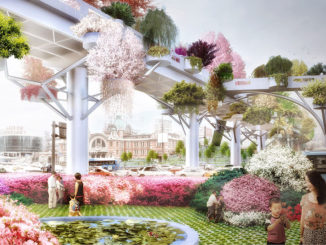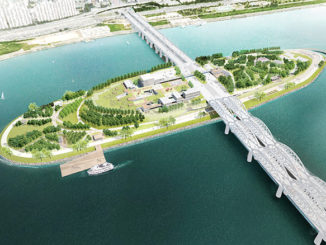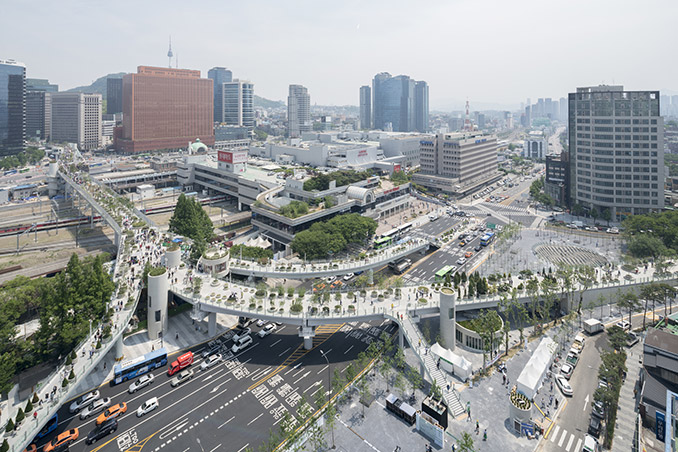
Today, Mayor of Seoul, Won-soon Park officially opens Seoul’s new public garden Skygarden, Seoullo 7017, a 983-metre botanical floating walkway, a transformed former city highway. Reborn as a linear park with over 200 local species of trees, shrubs and flowers are lined as a walkable plant library for residents and visitors to the city. “Skygarden offers a living dictionary of plants which are part of the natural heritage of South Korea”. Winy Maas, MVRDV co-founder, said in his introduction speech today.
Located in the heart of Seoul, a true plant village has been realised on a former inner city highway in an ever-changing urban area accommodating the biggest variety of Korean plant species and transforming it into a public 983-metre long park gathering 50 families of plants including trees, shrubs and flowers displayed in 645 tree pots, collecting around 228 species and sub-species. In total, the park will include 24,000 plants (trees, shrubs and flowers) that are newly planted many of which will grow to their final heights in the next decade.
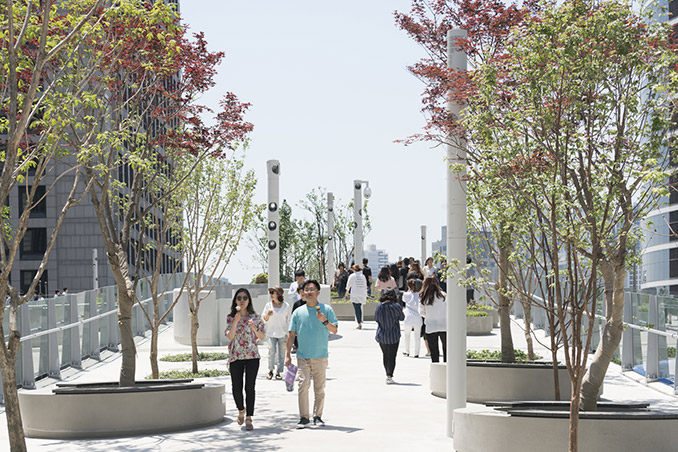
Seoullo, the Korean name for Skygarden translates to ‘towards Seoul’ and ‘Seoul Street’, while 7017 marks the overpass’ construction year of 1970, and its new function as a public walkway in 2017. The pedestrianised viaduct next to Seoul’s main station is the next step towards making the city and especially the central station district, greener, friendlier and more attractive, whilst connecting all patches of green in the wider area.
Since the project was won by MVRDV in May 2015, the main challenge of the Skygarden has been to transform the existing overpass into a public garden, overlaying a matrix of Korean flora onto the 16m elevated steel and concrete structure. How to transform a 1970’s highway into a Skygarden and how to change the daily life of thousands of people who cross Seoul’s city centre every day? From the start, MVRDV engaged with this need to change the forgotten and existing infrastructure into a green symbol that will become a catalyst for a greener quarter for Seoul. Together with the municipality, local NGO’s, landscape teams and city advisers are committed to accommodating the biggest diversity of flora into a strictly urban condition. New bridges and stairs connect the viaduct with hotels, shops and gardens.
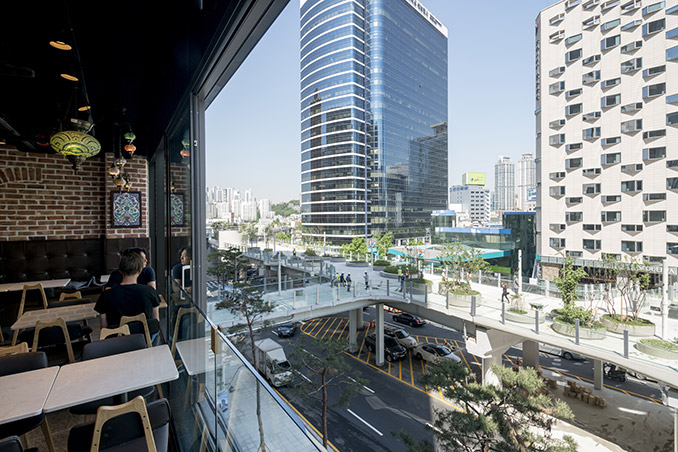
“Our design offers a living dictionary of plants which are part of the natural heritage of South Korea and now, existing in the city centre. The idea here is to connect city dwellers with nature, while at the same time also offering the opportunity of experiencing these amazing views to the Historical Seoul Station and Namdaemun Gate. Skygarden is an educational arboretum, a nursery for future species and one that in the future will act as a garden which can extend to other parts of Seoul as the plants grow and are transferred to new homes”, says Winy Maas, founding partner of MVRDV. “They are planted in containers of different size and height, and organised in groups of families. The families are ordered according to the Korean alphabet. This leads to surprising spatial compositions”.
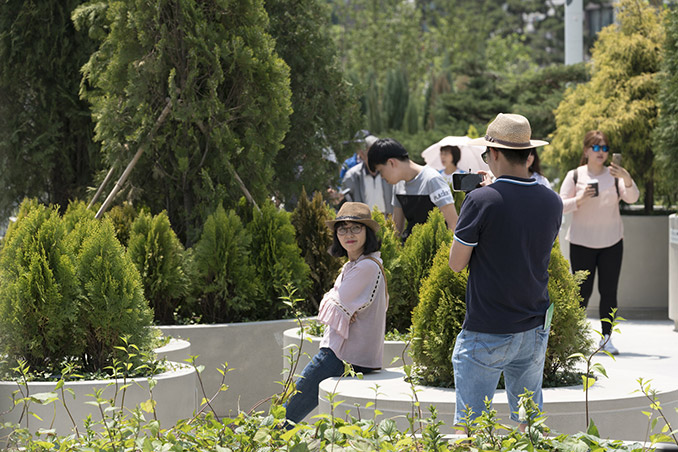
The linear park was designed as a collection of small gardens, each one with its very own composition, perfume, colour and identity. The landscape will change according to the seasons: the bright colours of leaves in autumn of the Aceraceae family (maples), the blossom of cherry trees and rhododendron in spring, the evergreen conifers trees in winter and shrubs and trees bearing fruit in summer. “But it is not only a ‘library’ of plants, a series of pots are bigger. Here the plants are lifted. Underneath there are shops, galleries, tea houses, a theatre, information centres, maintenance boots and restaurants, thus the viaduct is getting inhabited by a plant village”, continues Maas.
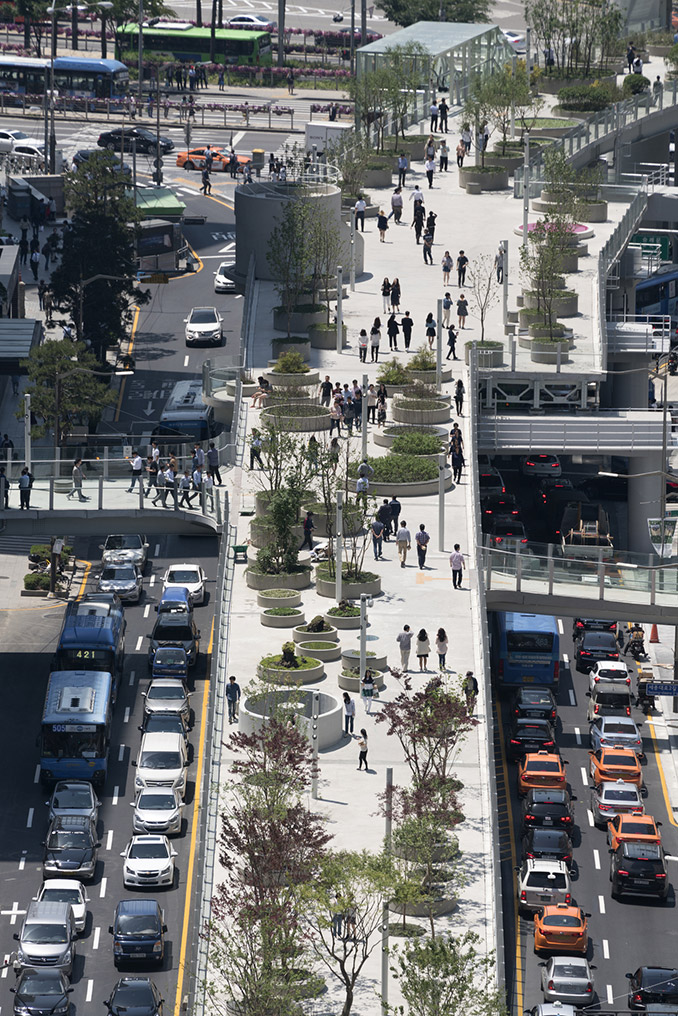
These contribute to enhancing the experience of users, boosting the park with activities that engage the city on a cultural and commercial level. Small mobile pots are added for seeds and plants that can be used afterwards in the bigger pots. A living nursery. Multiple stairs, lifts, bridges and escalators connect the city to the new park, rebounding it to the adjacent urban fabric. At night, the Skygarden is illuminated in blue lights in contrast to the bright city lights as the colour is friendly to nature. During festivals and celebrations, different colours can also be changed.
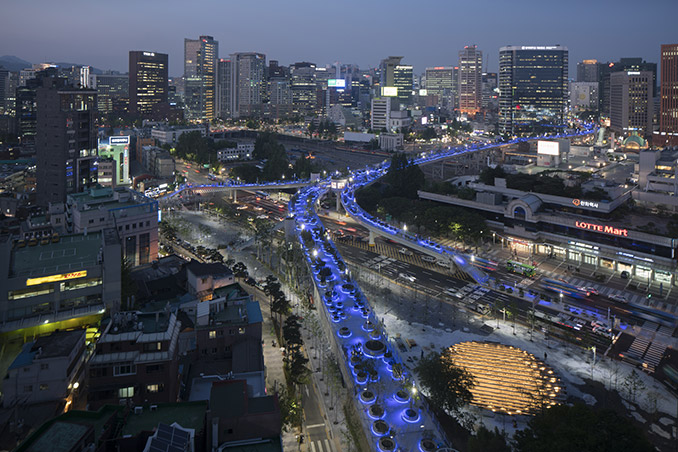
MVRDV worked together with co-architects, DMP and a dedicated team of experts including, Saman Engineering on for structural consultation, Rogier van der Heide and Nanam ALD for lighting, Ben Kuipers and KECC on the landscape design and plant varieties.
Youtube Video Credit | visitseoul
Youtube Video Credit |I•SEOUL•U (City of Seoul)
Seoullo – Seoul’s Skygarden
Credits
Competition
Winy Maas, Jacob van Rijs and Nathalie de Vries with Wenchian Shi, Kyosuk Lee, Kai Wang, Ángel Sánchez Navarro, Jaewoo Lee, Antonio Luca Coco, Matteo Artico and Jaime Domínguez Balgoma
Partners
Landscape Architect | Ben Kuipers, Delft, Netherlands
Local Architect | DMP, Seoul, Korea
Structure | Saman Engineering, Seoul, Korea
Local Landscape Designer | KECC, Seoul, Korea
Sustainability | EAN, Seoul, Korea
Architectural Structure | Cross, Seoul, Korea
Industrial Designers | Studio Makkink & Bey, Amsterdam, Netherlands
MEP | Samsin, Seoul, Korea
Traffic Engineers | Song Hyun R&D, Seoul, Korea
Lighting Design | Viabizzuno, Milan, Italy and Nanam Ald, Seoul Korea
App Design | nhtv, Breda, Netherlands
Cost Engineers | Myong Gun, Seoul, Korea
Design Devlopment
Winy Maas, Jacob van Rijs and Nathalie de Vries with Wenchian Shi, Kyosuk Lee, Mafalda Rangel, Daehee Suk, Daan Zandbergen, Kai Wang, Sen Yang and Dong Min Lee
Landscape Design | Ben Kuipers landscape architect, MVRDV
Local Architect | DMP, Seoul, Korea
Structure | Saman Engineering, Seoul, Korea
Local Landscape Designer | KECC, Seoul, Korea
Lighting Design | Rogier van der Heide, MVRDV and Nanam Ald, Seoul Korea
Construction
Team | Winy Maas, Jacob van Rijs and Nathalie de Vries with Wenchian Shi, Kyosuk Lee, Mafalda Rangel, Dong Min Lee
Landscape Design | Ben Kuipers Landscape architect

